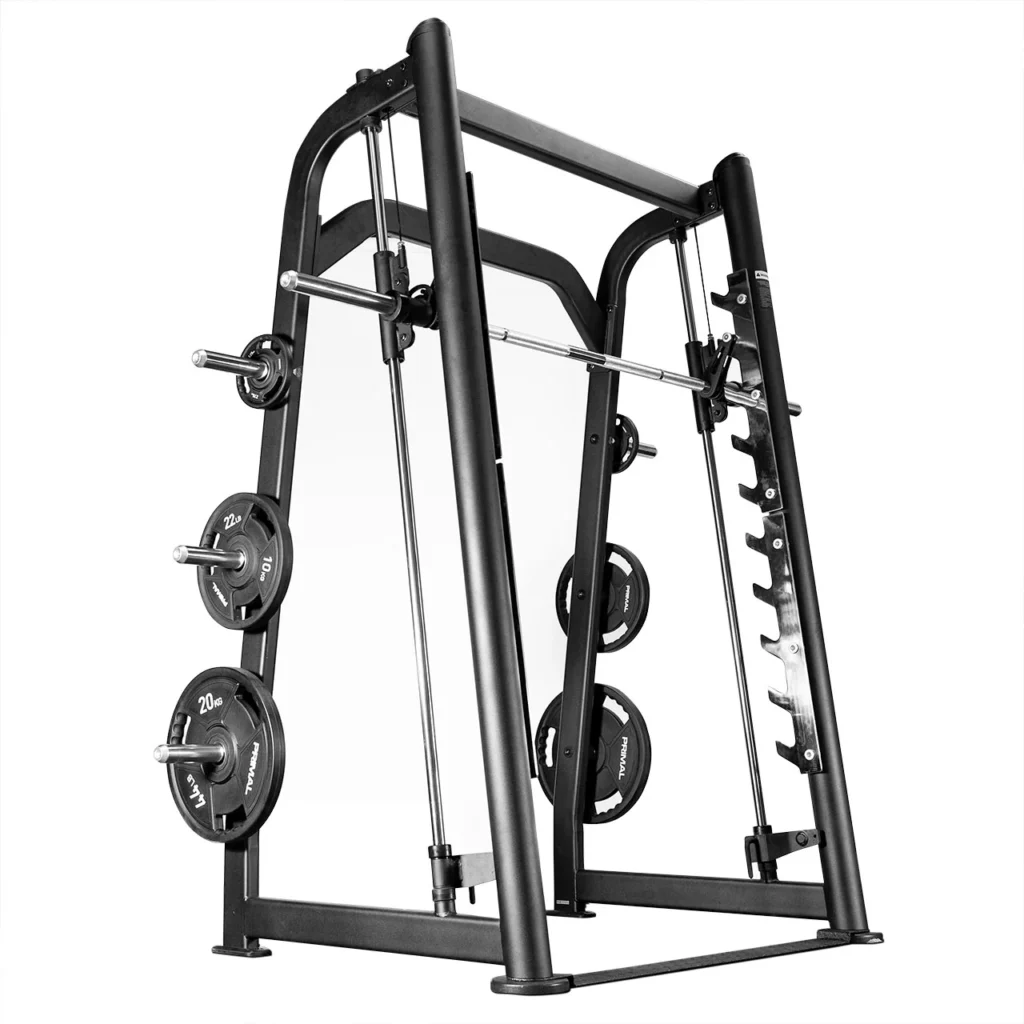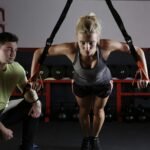The Smith machine is a staple in many gyms, beloved for its versatility and safety features. This piece of equipment, which consists of a barbell fixed within steel rails, allows for vertical movement, providing stability and control during exercises.
In this blog post, we will explore the benefits of the Smith machine, guide you through various exercises you can perform with it, and offer essential safety tips to ensure you use it effectively and safely.
Overview of the Smith Machine and Its Benefits
Smith machine is designed to offer a balance between free weights and fixed-path equipment. It provides the benefits of weight training while minimising the risks associated with free weights. Here are some of the key benefits of using the Smith machine:
- Enhanced Safety: The fixed bar path reduces the risk of losing balance or control of the barbell, making it a safer option for beginners and those lifting heavy weights. The built-in safety stops can catch the bar if you can’t complete a lift, which is particularly useful for solo workouts.
- Versatility: Smith machine can be used for a variety of exercises, targeting different muscle groups. From squats to bench presses and lunges, it supports a comprehensive workout routine. You can also perform compound movements as well as isolation exercises, making it a valuable addition to any workout plan.
- Stability and Support: The machine offers extra stability, allowing users to focus on form and muscle engagement without worrying about balancing the weight. This is particularly beneficial for exercises that require complex movement patterns, providing an added layer of confidence and control.
- Progressive Overload: With the ability to adjust the weight incrementally, the Smith machine is ideal for progressive overload, a key principle in strength training. By gradually increasing the weight, you can continually challenge your muscles, leading to strength and hypertrophy gains.
- Accessibility: It is user-friendly and accessible to people of all fitness levels, including those recovering from injuries or with limited mobility. The guided bar path and adjustable safety stops make it easier for individuals to perform exercises safely and effectively.
- Reduced Need for a Spotter: Since the Smith machine provides built-in safety features, it reduces the need for a spotter during heavy lifts. This is especially advantageous for individuals who train alone and want to push their limits without compromising safety.
- Versatile Angles and Positions: The Smith machine allows for adjustments in angles and positions that might be challenging with free weights. This versatility can help target muscles differently and address specific training goals or rehabilitative needs.
- Minimised Risk of Injury: By providing a controlled environment for lifting, the Smith machine minimises the risk of injuries associated with free weights. This is particularly useful for exercises that place a significant load on the spine and joints, such as squats and presses.

How to Use the Smith Machine for Different Exercises
The Smith machine’s versatility shines through in the range of exercises it supports. Here are some key exercises you can perform with this equipment:
Squats
How to Perform:
- Position the barbell at shoulder height.
- Stand under the bar, resting it on your shoulders and traps.
- Unhook the bar and step back slightly.
- Lower your body by bending your knees and hips, keeping your back straight.
- Descend until your thighs are parallel to the ground.
- Push through your heels to return to the starting position.
Benefits:
- Targets the quadriceps, hamstrings, glutes, and core.
- Offers controlled movement, reducing the risk of injury.
Bench Press
How to Perform:
- Position the bench underneath the bar.
- Lie on the bench with your feet flat on the ground.
- Grip the bar slightly wider than shoulder-width.
- Unhook the bar and lower it to your chest.
- Press the bar back up until your arms are fully extended.
Benefits:
- Focuses on the chest, triceps, and shoulders.
- Ensures a safe and controlled lifting path.
Lunges
How to Perform:
- Position the barbell at shoulder height.
- Stand under the bar and rest it on your shoulders and traps.
- Unhook the bar and step back into a staggered stance.
- Lower your back knee towards the ground, keeping your front knee over your ankle.
- Push through your front heel to return to the starting position.
- Repeat on the other leg.
Benefits:
- Works the quadriceps, hamstrings, glutes, and calves.
- Provides stability, allowing for a more focused muscle engagement.
Shoulder Press
How to Perform:
- Position the bench upright and place it under the bar.
- Sit on the bench with your back straight and feet flat on the ground.
- Grip the bar slightly wider than shoulder-width.
- Unhook the bar and press it overhead until your arms are fully extended.
- Lower the bar back to shoulder height.
Benefits:
- Targets the deltoids, triceps, and upper chest.
- Reduces the risk of losing balance during the lift.
Safety Tips and Common Mistakes to Avoid
While the Smith machine enhances safety, it’s essential to use it correctly to prevent injuries and maximise benefits. Here are some key safety tips and common mistakes to avoid:
Safety Tips
- Warm-Up Properly: Always warm up your muscles before starting your workout. This can include dynamic stretches and light cardio to increase blood flow and reduce the risk of injury.
- Start with Light Weights: Begin with a weight you can handle comfortably to master the movement and ensure proper form before progressing to heavier weights.
- Use the Safety Stops: The Smith machine is equipped with safety stops. Adjust these stops to a level that prevents the bar from descending too low, ensuring you can safely exit the exercise if needed.
- Maintain Proper Form: Focus on maintaining proper form throughout each exercise. Keep your back straight, core engaged, and avoid overextending or locking your joints.
- Controlled Movements: Perform each movement in a controlled manner. Avoid jerky or rapid motions that can lead to injury.
Common Mistakes to Avoid
- Incorrect Bar Placement: Ensure the bar is positioned correctly at the start of each exercise. For squats, it should rest on your shoulders, not your neck.
- Improper Foot Positioning: During squats and lunges, ensure your feet are positioned correctly to maintain balance and prevent knee strain. Your knees should align with your toes.
- Overloading the Bar: Avoid adding too much weight too quickly. Gradual progression is key to preventing injuries and achieving sustainable strength gains.
- Neglecting Range of Motion: Perform each exercise through its full range of motion to maximise muscle engagement and benefit.
- Ignoring Breathing Techniques: Proper breathing is crucial. Inhale during the lowering phase and exhale during the lifting phase to maintain stability and control.
Conclusion
The Smith machine is an incredibly versatile and safe piece of gym equipment that can enhance your workout routine. By understanding its benefits and learning how to use it correctly for various exercises, you can achieve significant strength and muscle gains while minimising the risk of injury. Remember to follow the safety tips and avoid common mistakes to make the most of your Smith machine workouts. Whether you’re a beginner or an experienced lifter, incorporating the Smith machine into your fitness regimen can help you reach your fitness goals more effectively.





